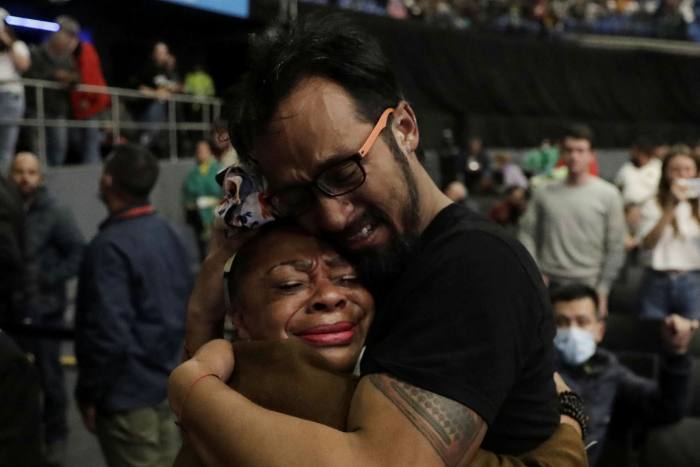Gustavo Petro, a former urban guerrilla who once spent time in jail for his political beliefs, won Colombia’s presidential election on Sunday and is expected to usher in the most leftwing government in the country’s history.
Petro earned 50.5 per cent of the vote to 47.3 per cent for his only rival, 77-year-old populist businessman Rodolfo Hernández, according to provisional official results. His tally of 11.3mn votes was the highest in Colombian electoral history. Hernández accepted defeat within hours in a short video message.
The result represents a sea change for the South American nation, which for decades has been ruled by moderate and conservative politicians, mostly from the established elite.
A member of the M-19 guerrilla group in the 1980s, Petro, who was arrested for illegal arms possession and said he was tortured in custody, has since served as a senator, congressman and mayor of Bogotá. But he had failed in two previous bids for the top job to crack Colombia’s tight-knit political system.
His victory means Latin American’s third most populous nation, home to 50mn people, and fourth-biggest economy will have its first black vice-president, Francia Márquez, an environmental campaigner and social activist who grew up in rural poverty in the violence-plagued south-west.
“This means a new model of government, different from anything Colombia’s seen before,” said Daniela Cuellar, senior consultant at business management firm FTI consulting in Bogotá.
“In Colombia, as in many countries in Latin America with a story of inequality, unemployment and violence — all exacerbated by the Covid pandemic — people are looking for different forms of government, and Petro’s victory is that.”

The result sent Petro’s supporters flocking to the streets in celebration, from the steamy Caribbean and Atlantic coasts to the Andes mountains and remote towns of the Amazon basin.
In the city of Villavicencio, once a hotbed of Marxist guerrilla violence, his backers braved a torrential downpour to drive through the streets on motorbikes honking horns. In highland Pasto, close to the border with Ecuador, hundreds gathered in the city centre, hugging each other in joy.
The business community will be less pleased. Petro’s radical call for an overhaul of Colombia’s economic model has spooked investors.
The currency, the peso, and local assets are likely to suffer, although as Monday is a public holiday in Colombia, the full effect might not be felt immediately.
“We’re going to see volatility in Colombian assets in the short term,” said Ani de la Quintana, associate director of Control Risks in Bogotá. “Clearly the peso and the markets are going to react negatively. The peso closed at 3,912 to the dollar on Friday. Who knows how much further it will depreciate now?”
“We could also see significant capital flight from Colombia, as happened in Peru with the election there last year. In the medium term, the rating agencies Moody’s and Fitch might downgrade Colombia further.”

Petro’s policy proposals include a ban on oil exploration, open-pit mining and fracking in a nation that relies on fossil fuels for about half its export revenue. He says the country should focus on manufacturing and agriculture instead.
The 62-year-old has pledged wholesale land reform, a wealth tax on the largest 4,000 fortunes in the country and the repeal of laws from two decades ago that liberalised the labour market.
His tax reform plans aim to raise at least $10bn a year, mainly by imposing levies on company dividends, offshore assets and large rural estates. The move “would affect 4,000-5,000 people in Colombia but it would bring social justice, stimulate production and give us the source of money we need”, he told the Financial Times in a recent interview.
He has pledged to use the revenue to fund universal free higher education and a minimum wage for 1.3mn people, and to cut the government deficit, which reached 7.1 per cent of gross domestic product at the end of 2021.
“We hope we can have a constructive dialogue with the new government,” said Bruce Mac Master, president of the National Business Association of Colombia. “Petro is an economist. He understands economic issues. The important thing now is that he names a really good cabinet.”
Despite his victory, Petro may struggle to enact his more radical proposals. His coalition, the Historic Pact, has only 15 per cent of the seats in both houses of congress.
“The next few weeks are going to be key to see what kind of alliances he can form,” Cuellar said.
Petro will take over as president on August 7 when rightwing incumbent Iván Duque steps down.
Duque’s government is deeply unpopular despite strong economic growth, and Sunday’s result marked a setback for Colombian conservatism, which had thrown its weight behind the unorthodox Hernández in a frantic bid to keep the left at bay.

